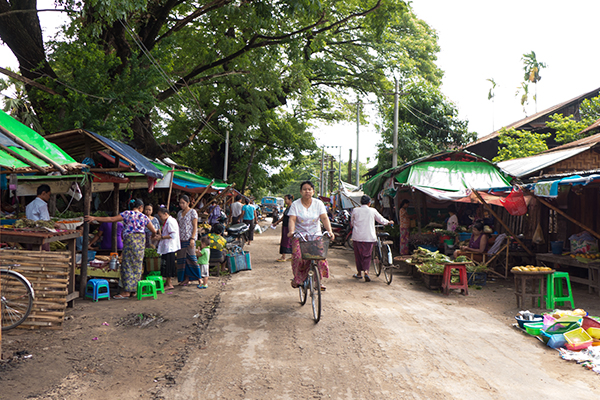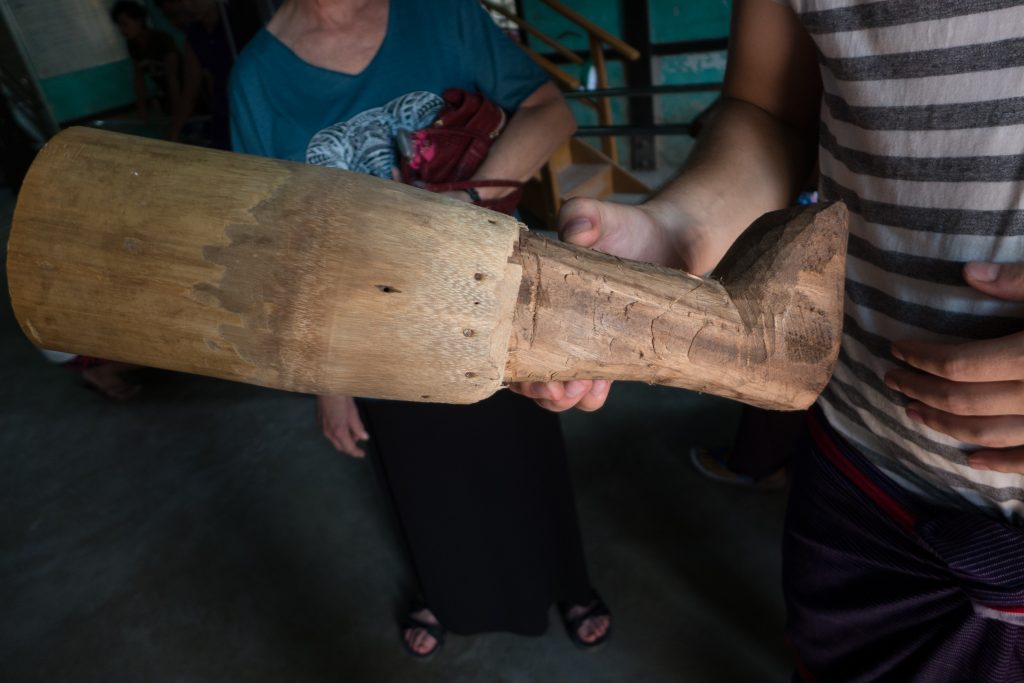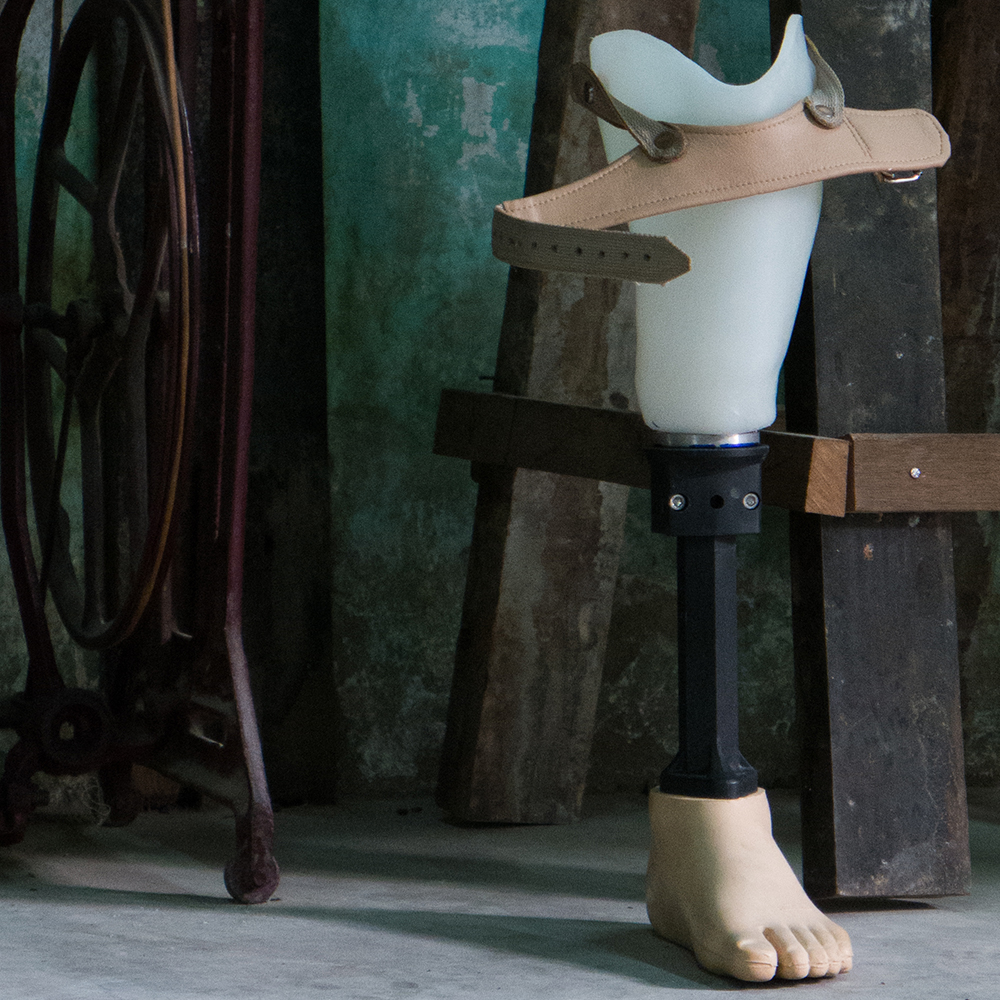
Ministry Updates
Prosthetics Lead to First Steps of Faith
November 17, 2016
by admin

For as long as Cho can remember, her Asian country has been a nation of landmines. Farmers trigger them while reclaiming fields, women while going to town, children while coming home from school.
After decades of ongoing war, rural areas, especially, are teeming with the passive weapons. And the resulting explosions have made missing limbs almost common.
When Cho was born missing an arm and both legs, she should have been able to get prosthetics. But like many people in the country, her parents were — and are — still suffering the economic toll of war.
They couldn’t afford prosthetics. They couldn’t even give Cho a wheelchair. So it must have seemed like a miracle when a mobile clinic arrived in their village 20 years after Cho was born, offering prosthetics for free.
Except the mobile clinic couldn’t help Cho either. Her limbs were too misshapen, and because she’d spent her entire life crawling on the ground, she would need months of therapy to learn to walk.
There was only one thing to be done: This was a job for TEAM missionary Paxton.
How Engineers Make Friends
When Paxton started college to study engineering, prosthetics and Asia were nowhere on his radar. That began to shift during a church mission trip to South America.
Paxton started thinking about long-term missions and felt his calling confirmed on an overseas internship the next year. He just couldn’t figure out how an engineer would get opportunities to build meaningful, missional relationships.
That’s when a professor pointed him to prosthetics: “He said it would be a great way to kind of combine [engineering] with a way to kind of meet people person-to-person.”
Meanwhile, Paxton met Zoe, a nursing student with a deep desire to serve Cho’s war-ravaged region of Asia.
“It just seemed really clear that it’s just a really good fit,” Paxton says. “The needs were there for kind of really the skills that he has given us.”
By 2014, Paxton and Zoe, now married, and their 4-month-old daughter were on their way to Asia on a one-month tourist visa.
The couple didn’t have any work lined up, and they had been warned that few foreigners get to practice medicine in their country of choice. But they were determined.
“We started talking to everyone who’s doing rehab and prosthetics in the country,” Paxton says.
Within the first month, Paxton found a free clinic to work with. After six to nine months, he got the government’s permission to work with it. In another few months, the couple had permission to move to the town where the clinic is located.

When locals come to Paxton’s clinic, some are wearing prosthetics they have fashioned for themselves, like this one. Photo by TEAM
Paxton spent his first six months at the clinic training new staffers on the latest techniques from America. By the time Cho arrived at the clinic, Paxton’s team was ready.
Standing Face-to-Face
When a patient arrives at the clinic Paxton works at, everything is covered — not just the prostheses and therapy, but lodging, food and a stipend to bring along a companion for assistance.
In Cho’s first week at the clinic, the staff got to work making casts of her legs and then forming the prostheses. Once the basic prostheses were made, they could get to the harder work of teaching Cho to walk.

The clinic is able to offer patients a prosthetic that is fitted to their bodies and increases their chance of regaining mobility. Photo by TEAM
“She’s always just been crawling on the ground for 20 years, so I think for her … just to go and stand and look somebody in the face … is a big step for her,” Paxton says.
Therapy starts simply, with patients learning to stand and sit the first day and then slowly moving into taking their first steps.
“When they’ve gone without walking for that long, it’s really difficult … to get them to a place where they feel more comfortable with the prosthesis than they did before,” Paxton says.
Some days, Cho woke up and decided the struggle was not worth it. But on good days, she learned to put more weight on the prostheses, telling the team about pain points so they could make adjustments along the way.
Paxton says frustration is common in the clinic. He warns new patients that it will probably be two months before they go home and six months to a year before they truly feel comfortable with the prosthesis.
But while Cho fights for her new normal, God is pouring hope into another part of her life.
An Open Heart
Unlike Paxton, Zoe has not been able to get permission to use her practice in the couple’s host country.
Nursing is far more regulated than prosthetics, so Zoe has been left to focus on learning the local language and building relationships where she can. One of those relationships is with Cho.
Legal restrictions and language barriers make sharing the Gospel tricky. When Zoe met Cho at the clinic, she started a conversation anyway.
The country’s common language is both women’s second language, but they pushed through a conversation and kept pushing as Zoe pursued the friendship.
“It’s just so difficult and slow, but it’s been kind of neat — like she was really hardened and quiet at first, and [now] she’s been opening up about things,” Zoe says.
When Zoe invited Cho to a program at church, Cho agreed.
The next day, Zoe says, “She was telling me, ‘Oh, I loved it so much! I really liked the singing. I didn’t understand because I’m not a Christian, but I really liked it.’”
Although Cho will soon go back home, Zoe is eager to see where God takes the friendship.
In his work at the clinic, Paxton is also building relationships with his co-workers and making progress in reducing the stigma around amputees. But the couple hopes to eventually move where there is greater spiritual need — and, it so happens, they would be closer to Cho’s home village.
After all they went through to find Paxton’s first role, the couple knows that move may not be easy. Still, they believe it will be worth the effort in time, and they encourage others to join them.
“There’s a huge need for people that the local people can rely on. … If you can come, just be here long enough; you’ll find people that can get you into the spots that you wanna be,” Paxton says. “But yeah, it takes time and patience.”
The names of people you’ve helped may be changed to protect their privacy.
Related articles


